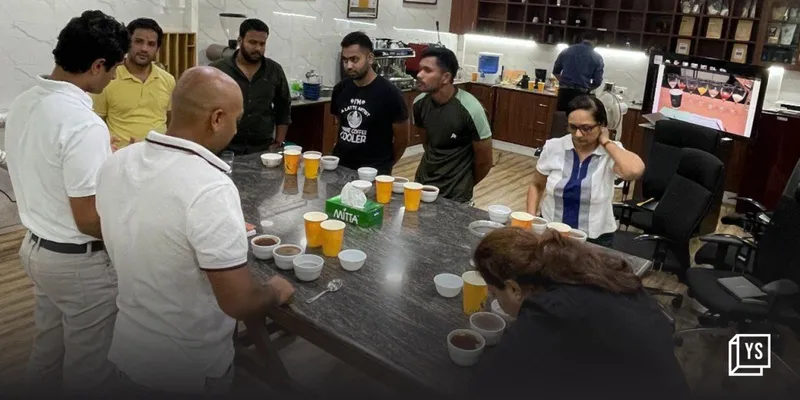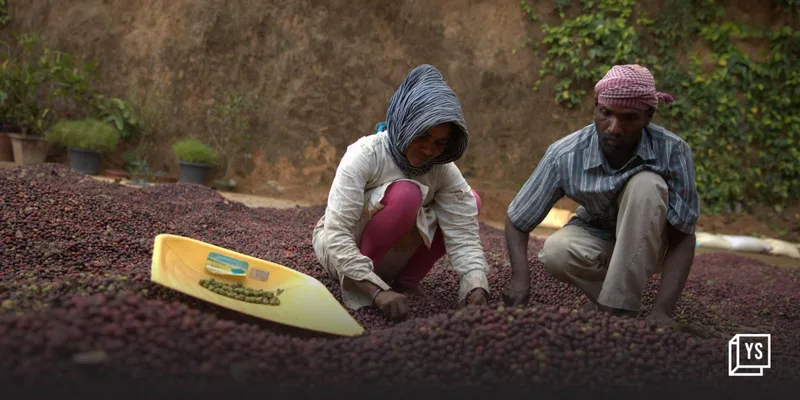Know thy Coffee: HumbleBean is on a mission to spread coffee literacy
Bengaluru-based omnichannel coffee startup HumbleBean Coffee has launched a Coffee Academy in Coorg to educate people about the ‘complexity and diversity of a humble bean like coffee’.
Bimal might seem like a regular barista. But he’s not content to simply brew and serve cups of coffee. He wants every customer to know what they are going to sip.
“I make sure they know their cup of coffee. I ask about the kind of taste they are looking for, and how strong they want their coffee. Most of the time, they go ahead with what I recommend even if they have something else in mind,” he says.
After losing his job at a high-end restaurant during the pandemic, Bimal joined as a barista. With no prior expertise in the sector, he was enrolled in a specialised course at HumbleBean. The course helped him understand the beverage better—starting from its plantation to the multiple brewing methods.
HumbleBean Coffee runs a small brew bar tucked away under the lush green cover of Bengaluru’s Lavelle Road. On a regular day, you might find Bimal sniffing and tasting a sample from every cup he brews.
is the brainchild of Soomanna Mandepanda and Puja Soomanna. Since 2017, the couple has been on a mission to make coffee consumption a more enjoyable and mindful experience. Their idea is to educate more people about the complexity and diversity “of a humble bean like coffee”.
In 2021, they launched the HumbleBean Coffee Academy in Coorg to spread coffee literacy among the masses. The academy offers short-term courses for coffee enthusiasts, home brewers, students pursuing hotel management, and coffee entrepreneurs.
The team of 22 people, including the co-founders, brew bar staff, and coffee academy experts, is based in Coorg and Bengaluru. At present, HumbleBean has only one coffee brew bar in Bengaluru and an online B2C channel that sells coffee beans of different types and roasts. A new coffee concept store is underway in Indiranagar which would replace the manual brew bar in a few weeks' time.
As per filings with the Registrar of Companies, HumbleBean made a revenue of approximately Rs 1.1 crore in FY21.
In July 2022, the coffee startup raised an angel round of Rs 4.5 crore from undisclosed investors.
Today, as Soomanna, Co-founder of HumbleBean, prepares his favourite pour-over, he recalls the days when he felt the need to clean up the coffee ecosystem.
“I wanted to get into the coffee ecosystem to build an Indian coffee company of global standards. I also wanted to orient farmers towards quality and help them to stay invested in agriculture,” he says.

HumbleBean Academy, Coorg
Spreading coffee literacy
The main objective behind the coffee academy was to ensure everyone in the coffee ecosystem was well informed about the beverage.
The team began by addressing the absence of a feedback system for farmers who grow coffee. A feedback mechanism was essential to bring changes in their farming practices and improve the quality of the produce.
“More than 85% of coffee farmers in India, mostly small and medium farmers, have never tasted their own coffee. They are unaware of how their coffee is appreciated around the world,” Soomanna says.
The coffee academy receives free coffee samples from more than 100 farmers across the country. The team prepares extensive reports on the sample quality and offers suggestions to farmers. The farmers bring in suggested changes in farming techniques and send new samples to the academy for further assessment.
“We test the samples again and buy their lot if the quality matches our parameters. Most of the time, we ask the farmers to quote a price instead of us fixing the price,” says Puja, Co-founder of HumbleBean, who looks after the B2C and hospitality side of HumbleBean.
The academy offers courses that focus on the art of brewing, food pairing with coffee, and more. These courses can be as short as one day or three days (for beverage enthusiasts) or as long as three months (for students in hotel management colleges). They are priced between Rs 10,000 and Rs 35,000.
HumbleBean has collaborated with a hotel management college in India to offer these courses for a semester.
Puja believes there is a need to train baristas in the early years of hotel management.
“Being a barista is more than serving a cup of coffee, especially today when manual brewing is finally getting recognised. That’s why we deliberately choose people who do not have any knowledge of coffee and are more receptive to knowledge,” she says.
Puja looks after the barista training course with Gaurav Ganapathi. A certified Q grader (a type of coffee evaluator), Gaurav leads the Coffee Academy in Coorg. He has been in the coffee industry since 2014 and previously worked with Tata Starbucks.
“Coffee is one of the most sustainable industries in the world; there is almost no carbon emission in the production process. The coffee academy is helping everyone in the ecosystem understand coffee as a plant better—its diversity in terms of species and types, different brewing techniques, and more,” Gaurav says.
Pastry chef Sana Kabra, who joined the HumbleBean team in March 2022, works closely with Puja and Gaurav and leads the food pairing courses at HumbleBean.
“Food pairing is an important part of the coffee experience. What kind of pastry would go best with a pour-over, what should be the level of the roast or grind of your coffee to make it go well with a croissant…these things require mindful consumption and a lot of trial and error,” Sana says.

HumbleBean collaborates with small and medium coffee farmers from across the country
Overcoming the pandemic
Like any other brick-and-mortar business, HumbleBean was hit hard by the pandemic. Their first manual brew bar in Residency Road, Bengaluru, launched in 2019, was shut down due to operational difficulties.
Around the same time, the brand collaborated with a high-end retail outfit GoNative to set up its model brew bar on Lavelle Road.
The HumbleBean team took the pandemic as an opportunity to study and gather data about customer perception of manually brewed coffees, and coffees served from small and medium farms, and studied the unit economics of a coffee brand. They also worked on creating a range of coffee beverages and the delivery mechanism.
“During this lean time, we also consolidated our backend work, the academy, small and medium farm outreach, plantation management, flavour science with regards to food pairing along with coffee. We built a solid core team of subject matter specialists in plantation management, roasting, and flavour science. Most of them are third-generation small farmers who have spent time in large coffee companies,” Soomanna says.
Brewing a bright future
According to a report published by Research and Markets, Indian retail coffee is largely dominated by the southern region and is projected to reach over $253.8 million by 2025, growing at a Compound Annual Growth Rate (CAGR) of 21.04% from 2017 to 2025.
HumbleBean aims to tap this growing market while competing with major global brands like Starbucks, Barista, Tim Hortons, and Indian brands like Blue Tokai, Third Wave Coffee Roasters, Araku etc.
“We know about the competitive landscape but we also know that everyone who walks into our cafe either knows their coffee very well or is passionate to learn more about coffee. We are banking primarily on word of mouth over other marketing strategies,” Soomanna says.
HumbleBean plans to launch its concept store in Indiranagar, Bengaluru. It would also serve as the second location for the coffee academy and as the second manual brew bar.
The startup also has plans to expand to other countries in the Asia-Pacific region.
“The final goal remains the same: establish HumbleBean as an Indian global brand that is sustainable, grounded, and invested in the place of production,” Soomanna says.
(The copy was updated to correct a typo in the name of the co-founder)
Edited by Teja Lele









